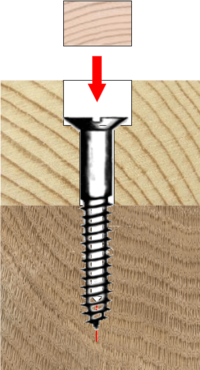Counterboring: Difference between revisions
From DT Online
Added category link |
m Added text |
||
| Line 2: | Line 2: | ||
[https://en.wikipedia.org/wiki/Counterbore '''Counterboring'''] is used to enlarge the diameter of the top of a drilled hole such that the head of a bolt or cap screw can sit flush with the top surface of the workpiece. | [https://en.wikipedia.org/wiki/Counterbore '''Counterboring'''] is used to enlarge the diameter of the top of a drilled hole such that the head of a bolt or cap screw can sit flush with the top surface of the workpiece. The '''Counterbore''' is usually a flat-bottomed hole. This can be achieved with '''[[Forstener Bits]]''', and usually, it is best to drill the '''Counterbore''' first then complete the drilled hole afterwards. | ||
Latest revision as of 20:46, 8 November 2015

Counterboring is used to enlarge the diameter of the top of a drilled hole such that the head of a bolt or cap screw can sit flush with the top surface of the workpiece. The Counterbore is usually a flat-bottomed hole. This can be achieved with Forstener Bits, and usually, it is best to drill the Counterbore first then complete the drilled hole afterwards.
Counterboring may also be used to sink Woodscrews deep into a piece of timber such that the head may be covered with a plug of material (e.g. as cut using a Plug Cutter) or to avoid the use of very long screws by setting the screw head part way through the first piece to be joined